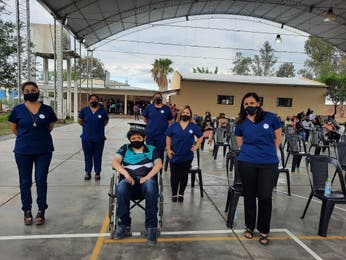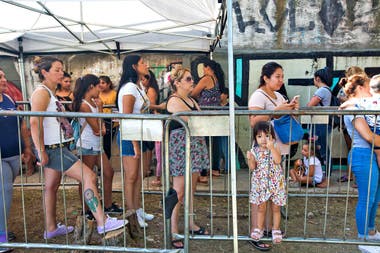Overcrowded prisons
, with terrible hygiene and health conditions, where overcrowding and violation of rights are a constant. In this context – a reality that has been denounced by ombudsmen and specialized organizations for years –
The fear of the detainees that the COVID-19 breaks out and generates a massive contagion grows every minute.
“The feeling of
affraid to die
was entering and
settling in the halls
“said Diego Tejerina, a prisoner in Unit 48 of the San Martín prison complex.
The
tension and claims
for actions that guarantee safety
they are also on the rise.
What are the main concerns and requests in the country’s prisons?
Why do detainees assure that it is practically impossible for them to adopt protective measures and preventive distancing?
THE NATION
He spoke with four men deprived of their liberty to learn how the pandemic is lived from within.
Defenders and other referees consulted agree that
the general panorama of the penitentiary system in Argentina only worsened in the context of COVID-19
. Nicolás Laino, of the National Ombudsman’s Office (DGN) -organism in charge of Stella Maris Martínez-, stressed that the prison population is especially vulnerable to the spread of the virus for various reasons. Firstly, because the buildings are poorly ventilated in buildings and in many of the prisons there are not individual cells, but collective pavilions, which are overcrowded. “To this we must add that in the Federal Penitentiary Service (SPF), which is where we intervene, the previous government declared the prison emergency a year ago and the current one maintained it,” said Laino, official public defender.
This week, in full
riot in Unit 23
of the Buenos Aires Penitentiary Service (SPB), in Florencio Varela,
a man died in circumstances still under investigation
. In six halls of the maximum security sector
a hunger strike had begun
. It is a measure that they also started
341 other prisoners from different Buenos Aires prisons
, after failing a dialogue table in which they demanded release, house arrest and assisted liberties. Inmates, judicial officials, SPB authorities and the provincial Ministry of Justice and Human Rights participated in the negotiation. A few days earlier, the SPB had
confirmed the first positive case of COVID-19
in a detainee, also in the Varela complex. This morning, as reported to this media detainees and confirmed from the DGN,
another riot began in the Devoto prison
.
From the Ministry of Justice and Human Rights of the Nation, they specified that yesterday the person in charge of that portfolio, Marcela Losardo, made a videoconference with members of the Interinstitutional System of Control of Prisons (SICC), judges, prosecutors, defenders, and representatives of other organizations to analyze the situation of the federal prison system in the context of the pandemic. At the meeting, as indicated,
the impact of the measures imposed by the quarantine on federal penitentiary units was evaluated
and the participants “agreed to work in an articulated way to mitigate the difficulties affecting the inmates.”
For Andrea Casamento, founder and president of the
Civil Association of Family Members of Detainees (Acifad),
the situation is very serious. Every day, they receive cases of
desperate mothers and other family members
to the association, to whom the team of psychologists and social workers seeks to give containment and embarrassment. “We are all concerned about our family. Imagine when you have a child locked up and without the possibility of claiming to ask for health,” Casamento summarized.
How can prisoners go through the disease today, in case of contracting the virus, if eight people are living in a cell for three and with four mattresses?
Andrea Casamento, President of Acifad
The referent maintained that the axis of the discussion should be how to guarantee access to health for prisoners at this time. “I would like to know what is the protocol that is being implemented in prisons. How can they pass the disease today, in case of contracting the virus, if eight people are living in a cell for three and with four mattresses?” .
Laino explained that
in the SPF there is overcrowding:
“That means more overcrowding. In addition, hygiene elements are scarce. Beyond that the Service, with the coronavirus health crisis, ordered some measures, generally lacking, for example, soaps and this makes the situation even more of a problem. breeding ground, “warned the public defender.
What we defenders are looking for is to release people who can reasonably be outside, so that when there are cases of COVID-19 among the detainees, the prison is not overcrowded
Nicolás Laino, DGN
According to the lawyer, another key problem to consider is what will happen when the virus begins to circulate forcefully through prisons, something that could happen in the short term, considering that the first cases have already been detected. “From the DGN, we have been marking the deficiencies of the health system in prisons for years. Many times, specialties are lacking: for example, pulmonologists. Even if you go to the Ezeiza central prison hospitals or to the Devoto hospital, the rooms / cells They are very stuck.
It is difficult to think of generating quarantine spaces there
“described Laino.
Another aggravating factor is the existence of a significant number of detained persons who have pre-existing illnesses or who acquired in prison.
According to SPF data, under its orbit there are 1280 inmates who are considered a population at risk.
Last week, the Federal Chamber of Criminal Cassation (CFCP), based on a proposal made by Guillermo Todarello, public defender and co-owner of the DGN Prison Commission, and by Francisco Mugnolo, head of the Nation’s Penitentiary Office. (PPN),
recommended to lower courts to grant alternative measures to prison
. Through the agreed 9/2020, the country’s highest authority in criminal matters considered the current double emergency situation: the health, declared by the pandemic, and the one caused by the overcrowding that occurs in federal prisons, “the result of hypercarceration” .
The provision was adopted with the
goal of reducing the prison population
“in order to inhibit, to the greatest extent possible, the existing risk to the health and physical integrity of persons deprived of their liberty and also of the prison staff themselves,” in front of COVID-19.
Laino explained that the cameramen recommended to the courts alternative actions to prison, mainly the granting of house arrest, with the corresponding control and monitoring mechanisms. Who is this Federal Chamber resolution intended for? People who are in preventive detention for non-violent crimes, those in legal conditions to imminently access the regime of assisted liberty, temporary exits or parole; pregnant or detained women with their children; people with a higher health risk or with a disability that makes them more vulnerable to the virus, among others. Yesterday, the National Chamber of Cassation in Criminal and Correctional matters of the city of Buenos Aires issued a recommendation along the same lines.
In March and April, DGN advocates made more than 1,000 requests for release or parole. “What we seek is to release people who can reasonably be outside, so that when there are cases of COVID-19 among federal detainees, the prison is not overcrowded or overcrowded, the conditions of the health services are better and the possibilities are less contagion, “Laino explained.
Although the defender considered that there is usually awareness of the risk that the health system in prisons will collapse and the need to release those who are in a position to be released, something that they agree from the Government, what they see from public defense is that “many lower level judges, even taking into account what the CFCP established, which is the highest authority,
they continue to have very restrictive criteria and reject requests for freedom
”
In the Buenos Aires Penitentiary Service
there are about 49,000 prisoners, when the capacity is for 22,000 or 24,000, depending on how it is measured.
In recent days, Acifad has released the opinion of more than 600 inmates – most of whom are from the SPB and, to a lesser extent, from the Federal – about the precautions taken in the face of the pandemic:
92% of the respondents said that there were not enough hygiene elements for the entire ward,
and 40% answered that prison staff who have contact with them never use protection measures, while almost 44% indicated that they only do so sometimes.
For years there has been a humanitarian crisis in prisons. It is a situation where people die and no measures are taken to prevent it.
Mario Coriolano, defender against the SCBA
The defender before the Supreme Court of Justice of the province of Buenos Aires (SCBA), Mario Coriolano, explained that for years they have been pointing out the existence of a “humanitarian crisis” in closed centers, police stations and jails. “It is an expression that was not given the importance it has: it is a situation where people die and no measures are taken to prevent it. Now, we are facing a pandemic that in the context of overcrowding
is showing the consequences of not taking action on time
“Coriolano concluded.
ALSO
.
Publicado en el diario La Nación




